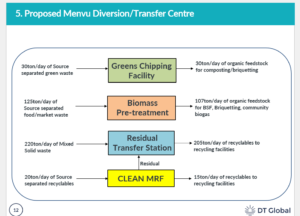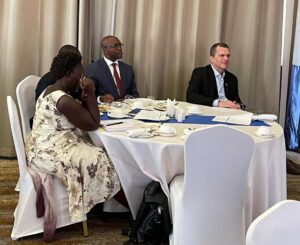Kampala is on a positive trajectory to fulfilling its vision of a vibrant, attractive, and sustainable city. GGGI Uganda for the past two years, working with DT Global, the consultant, formulated the Solid Waste Management Strategy of the Greater Kampala Metropolitan Area. This strategy offers a high economic rate of return and significant environmental and public health benefits. The strategy has proposed the approach of waste diversion and transfer to ensure valuable materials are recovered for reuse, recycling, and upcycling. This will address the waste challenge, create new industrial opportunities, create green jobs, and reduce the need for landfilling in the long run. Under the GGGI Uganda’s Greening Uganda’s Urbanization and Industrialization, project funded by the European Union, feasibility studies and master designs have been completed in addition to the strategy.

Waste opportunities offered by the strategy.
The establishment of transfer stations and diversion centers requires dedicated infrastructure to handle the different waste streams. A typical waste diversion/ transfer station constitutes material recovery facilities (MRF), waste sorting bays, refuse transfer stations (RFS), waste treatment plans, and specialized organic facilities such as the Black soldier fly technology (BSF).
This key infrastructure requirement is what prompted GGGI, in partnership with the Government of Uganda and its sub-nationals, to organize an investment dialogue on the 15th of March 2023, with potential financiers. GGGI Uganda recently supported the completion of feasibility studies and master designs for the two-pilot waste diversion and transfer stations at Kiteezi and Menvu, owned by KCCA and Nansana/Kira municipalities respectively.

Some of the financiers present. (The European Union and dfcu Bank)
The dialogue was attended by respective government subnational and key local and foreign financiers. The financiers included the World Bank, the European Union, the French Development Agency, GIZ and dfcu Bank. The Government representatives included The Ministry of Kampala Capital City and Metropolitan Affairs (MoKCC & MA), the Kampala Capital City Authority (KCCA), the National Planning Authority (NPA), and the Greater Kampala Municipalities of Nansana and Kira. The Financing opportunities were explored and a number of partners suggested possibilities in financing the infrastructure, once the same have been formally approved by the Development Committee of the Ministry of Finance, Planning and Economic Development (MoFPED).
The potential financing for waste management infrastructure and subsequent processes fit well in the GKMA Solid Waste Management Strategy. It is anchored on the waste hierarchy and a circular economy model. These seek to make efficient use of natural resources by promoting waste prevention, reuse, recycling and reduce the need for waste disposal. In addition, the strategy is built upon the components of increased waste collection services, governance, participation, financial sustainability, circular economy model, waste recovery and disposal.